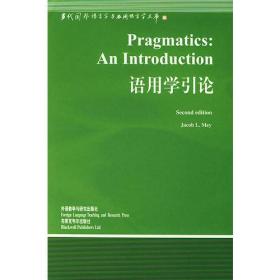
语用学引论(第二版)
①全新正版,现货速发,7天无理由退换货②天津、成都、无锡、广东等多仓就近发货,订单最迟48小时内发出③无法指定快递④可开电子发票,不清楚的请咨询客服。
¥ 47.23 7.0折 ¥ 67 全新
库存2件
浙江嘉兴
认证卖家担保交易快速发货售后保障
作者JACOB L. MEY
出版社外语教研
ISBN9787521343212
出版时间2023-04
装帧平装
开本其他
定价67元
货号31711461
上书时间2024-10-13
- 在售商品 暂无
- 平均发货时间 17小时
- 好评率 暂无
- 最新上架
商品详情
- 品相描述:全新
- 商品描述
-
目录
Preface
PART Ⅰ: Basic Notions
1 Defining Pragmatics
1.1 Preliminaries
1.1.1 A look at history
1.1.2 The importance of being a user
1.2 Pragmatics: Definition and Delimitation
1.2.1 A definition
1.2.2 Component, perspective or function?
1.2.2.1 Component vs. perspective
1.2.2.2 Function
1.3 What Use is Pragmatics?
1.3.1 Theory and practice
1.3.2 Uses and aims
1.3.2.1 Why do we need pragmatics?
1.3.2.2 The aims of pragmatics
2 Some Issues in Pragmatics
2.1 The Pragmatic Waste-basket
2.2 Linguists Without Borders
2.3 Philosophers, Ordinary People and Ordinary Language
2.4 Of Cats and Ducks
2.5 Linguistics and Reality: Presupposition
2.6 A World of Users
PART Ⅱ: Micropragmatics
3 Context, Implicature and Reference
3.1 Context
3.1.1 The dynamic context
3.1.2 Context and convention
3.2 Implicature
3.2.1 What is an implicature?
3.2.2 Implications and implicatures
3.2.3 Conversational implicature
3.2.4 Conventional implicature
3.3 Reference and Anaphora
3.3.1 On referring
3.3.2 Reference, indexicals and deictics
3.3.3 From deixis to anaphora
4 Pragmatic Principles
4.1 Principles and Rules
4.2 Some Principles Discussed
4.2.1 The Communicative Principle
4.2.2 The Cooperative Principle
4.2.2.1 Dostoyevski and the rubber ball
4.2.2.2 Cooperation and ‘face’
4.2.2.3 Cooperation and ‘flouting’
4.2.3 Politeness and other virtues
4.3 Rethinking Grice
4.3.1 Horn's two principles
4.3.2 Relevance and 'conspicuity'
5 Speech Acts
内容摘要
本书由丹麦语言学教授JacobL.Mey所著,是语用学领域的入门教材。本书首先对语用学作出界定,为全书各专题的讨论从语用观角度提供认识框架;接下来探讨微观语用学;最后研究宏观语用学,着重讨论了宏观
语用研究的重要性、必要性以及研究可涉及的方面。本书结构和内容明显不同于英美语用学研究传统的思路和取向,让人耳目一新。
相关推荐
— 没有更多了 —



















以下为对购买帮助不大的评价